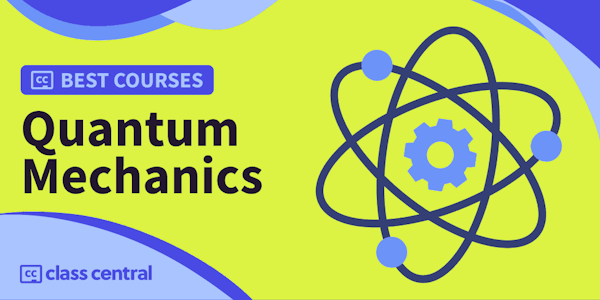Overview
This Specialization is intended for engineers seeking to acquire fundamental understanding of quantum mechanics which are the basis of modern electrical, mechanical and quantum engineering. Through 3 courses, you will learn (1) basic concepts such as superposition and entanglement of quantum states, measurement in quantum mechanics and uncertainty principle, (2) mathematical tools needed to describe and manipulate quantum states, (3) advanced theory of angular momentum and (4) approximation methods widely applicable in many fields.
Syllabus
Course 1: Foundations of Quantum Mechanics
- Offered by University of Colorado Boulder. This course can also be taken for academic credit as ECEA 5610, part of CU Boulder’s Master of ... Enroll for free.
Course 2: Theory of Angular Momentum
- Offered by University of Colorado Boulder. This course can also be taken for academic credit as ECEA 5611, part of CU Boulder’s Master of ... Enroll for free.
Course 3: Approximation Methods
- Offered by University of Colorado Boulder. This course can also be taken for academic credit as ECEA 5612, part of CU Boulder’s Master of ... Enroll for free.
- Offered by University of Colorado Boulder. This course can also be taken for academic credit as ECEA 5610, part of CU Boulder’s Master of ... Enroll for free.
Course 2: Theory of Angular Momentum
- Offered by University of Colorado Boulder. This course can also be taken for academic credit as ECEA 5611, part of CU Boulder’s Master of ... Enroll for free.
Course 3: Approximation Methods
- Offered by University of Colorado Boulder. This course can also be taken for academic credit as ECEA 5612, part of CU Boulder’s Master of ... Enroll for free.
Courses
-
This course can also be taken for academic credit as ECEA 5612, part of CU Boulder’s Master of Science in Electrical Engineering degree. This course teaches commonly used approximation methods in quantum mechanics. They include time-independent perturbation theory, time-dependent perturbation theory, tight binding method, variational method and the use of finite basis set. In each case, a specific example is given to clearly show how the method works. At the end of this course learners will be able to: 1. use time-dependent perturbation theory to obtain first- and second -order corrections to energies and wavefunctions, 2. use time-dependent perturbation theory and obtain transition rates, and 3. use tight binding method, variational method and finite basis set to obtain approximate solutions of various quantum mechanics problems.
-
This course can also be taken for academic credit as ECEA 5611, part of CU Boulder’s Master of Science in Electrical Engineering degree. This course introduces the quantum mechanical concept of angular momentum operator and its relationship with rotation operator. It then presents the angular momentum operators, their eigenvalues and eigenfunctions. Finally, it covers the theory of angular momentum addition. At the end of this course learners will be able to: 1. describe and analyze angular momentum states using quantum mechanically defined angular momentum operators, 2. solve angular momentum eigenvalue equations and 3. add angular momenta quantum mechanically.
-
This course can also be taken for academic credit as ECEA 5610, part of CU Boulder’s Master of Science in Electrical Engineering degree. This course covers the fundamental concepts and topics of quantum mechanics which include basic concepts, 1D potential problems, time evolution of quantum states, and essential linear algebra. It provides undergraduate level foundational knowledge and build on them more advanced topics. At the end of this course learners will be able to: 1. demonstrate full grasp of basic concepts in quantum mechanics including wave-particle duality, operators and wavefunctions, and evolution of quantum states, 2. achieve mastery of the mathematical apparatus needed for quantum mechanics and 3. attain foundational knowledge required to learn more advanced quantum mechanics and applications.
Taught by
Wounjhang Park




